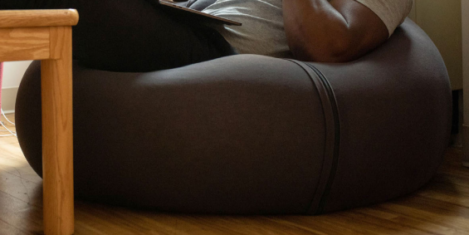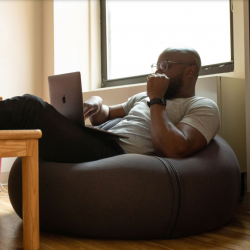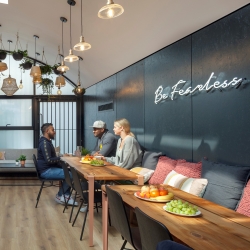To provide the best experiences, we use technologies like cookies to store and/or access device information. Consenting to these technologies will allow us to process data such as browsing behaviour or unique IDs on this site. Not consenting or withdrawing consent, may adversely affect certain features and functions.
The technical storage or access is strictly necessary for the legitimate purpose of enabling the use of a specific service explicitly requested by the subscriber or user, or for the sole purpose of carrying out the transmission of a communication over an electronic communications network.
The technical storage or access is necessary for the legitimate purpose of storing preferences that are not requested by the subscriber or user.
The technical storage or access that is used exclusively for statistical purposes.
The technical storage or access that is used exclusively for anonymous statistical purposes. Without a subpoena, voluntary compliance on the part of your Internet Service Provider, or additional records from a third party, information stored or retrieved for this purpose alone cannot usually be used to identify you.
The technical storage or access is required to create user profiles to send advertising, or to track the user on a website or across several websites for similar marketing purposes.
 Whilst initial lockdowns saw a positive response from managers looking to support their teams, it seems maintaining this level of empathy a full year later is for some leaders proving unsustainable claims business training course provider, The Hub Events. The survey of 1115 employees who work from home claims that 53 percent felt their manager had become less empathetic during the most recent lockdown. (more…)
Whilst initial lockdowns saw a positive response from managers looking to support their teams, it seems maintaining this level of empathy a full year later is for some leaders proving unsustainable claims business training course provider, The Hub Events. The survey of 1115 employees who work from home claims that 53 percent felt their manager had become less empathetic during the most recent lockdown. (more…)








 More than half of financial institutions say they expect to have more ‘gig economy’ based employees over the next three to five years, according to PwC’s report,
More than half of financial institutions say they expect to have more ‘gig economy’ based employees over the next three to five years, according to PwC’s report, 
 Businesses using artificial intelligence (AI) solutions benefit from a happier and more efficient workforce, claims new research from
Businesses using artificial intelligence (AI) solutions benefit from a happier and more efficient workforce, claims new research from 


 Investment in digital technology is set to increase UK GDP by £232bn (6.9 percent) in 2040, according to a new
Investment in digital technology is set to increase UK GDP by £232bn (6.9 percent) in 2040, according to a new 
 The impact of the nation’s deteriorating mental health from Covid-19 lockdowns and other restrictions cost UK businesses £14bn last year, according to a study by
The impact of the nation’s deteriorating mental health from Covid-19 lockdowns and other restrictions cost UK businesses £14bn last year, according to a study by 
 One important concept the pandemic has taught us is that irrespective of where we work and whatever form the future workplace takes, our brand must remain strong. With much of our workforce now working from home, how do we bridge the gap between corporate and home life? As head offices re-form into social hangout hubs, and dining tables become makeshift desks, one message is loud and clear – connection with and delight in a brand is everything. From our internal talent and culture, and supply partnerships, to external customer persona, we must strengthen our culture both inside and out.
One important concept the pandemic has taught us is that irrespective of where we work and whatever form the future workplace takes, our brand must remain strong. With much of our workforce now working from home, how do we bridge the gap between corporate and home life? As head offices re-form into social hangout hubs, and dining tables become makeshift desks, one message is loud and clear – connection with and delight in a brand is everything. From our internal talent and culture, and supply partnerships, to external customer persona, we must strengthen our culture both inside and out. 
 For now, just forget the
For now, just forget the 
 Generating £27.8 billion gross value added annually, and employing more than 360,000 people, the West Midlands is the UK’s largest centre for business, professional and financial services (BPFS) outside London. Now, business leaders from Shoosmiths, Wesleyan, Bruntwood CBRE amongst others, are working with the region’s just under 12,500 leading tech and digital companies to see how they can integrate AI and advanced technology into their everyday activities.
Generating £27.8 billion gross value added annually, and employing more than 360,000 people, the West Midlands is the UK’s largest centre for business, professional and financial services (BPFS) outside London. Now, business leaders from Shoosmiths, Wesleyan, Bruntwood CBRE amongst others, are working with the region’s just under 12,500 leading tech and digital companies to see how they can integrate AI and advanced technology into their everyday activities. 
 Let’s be honest, work life pre 2020 had its flaws, whilst the longing for variety of scenery, change of pace and even a train journey (somewhere…ANYWHERE) would be welcomed by many of us right now, many of us had become a bit ‘hamster wheel’ in our approach. Commuting was stressful, expensive and time hungry; our natural and individual rhythms squeezed into a set 9-5 schedule and workplace design had become a bit ‘quantity over quality’ – desks have been reducing in size year upon year in order that capacity could be increased. We had reached a point at which everything was ripe for change but there was largely a resistance to both flexible working requests and embracing much of the technological advancements that were already at our fingertips.
Let’s be honest, work life pre 2020 had its flaws, whilst the longing for variety of scenery, change of pace and even a train journey (somewhere…ANYWHERE) would be welcomed by many of us right now, many of us had become a bit ‘hamster wheel’ in our approach. Commuting was stressful, expensive and time hungry; our natural and individual rhythms squeezed into a set 9-5 schedule and workplace design had become a bit ‘quantity over quality’ – desks have been reducing in size year upon year in order that capacity could be increased. We had reached a point at which everything was ripe for change but there was largely a resistance to both flexible working requests and embracing much of the technological advancements that were already at our fingertips. 
 Outdated attitudes towards technology amongst senior facilities management business leaders are at risk of jeopardising future business survival, claims new research by
Outdated attitudes towards technology amongst senior facilities management business leaders are at risk of jeopardising future business survival, claims new research by 








February 19, 2021
A new mindset on climate change is emerging from the pandemic
by Aki Stamatis • Comment, Environment